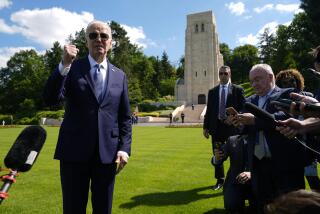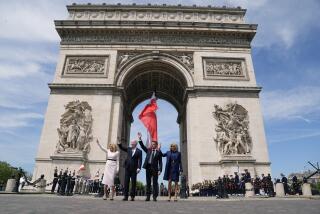Bush’s Popularity Surges in Europe in Conflict’s Wake : Reaction: His prowess in guiding the victorious allied coalition draws a torrent of praise.
- Share via
PARIS — The venerable French newspaper Le Monde, seldom quick with praise for American leaders, said in a Friday editorial that President Bush’s command of the allied war effort has made him “the most popular American President since Harry Truman on the day after victory in 1945.”
The mass-circulation German tabloid Bild Zeitung compared the American President to Otto von Bismarck, the “Iron Chancellor” who unified Germany in the 19th Century.
Former French President Valery Giscard d’Estaing was so full of praise for Bush he could hardly contain himself. “A great President who has erased the shameful stain of Vietnam,” he declared.
A French opinion poll, released Friday, gave the American leader a 76% approval rating, only four points lower than that of French President Francois Mitterrand, who is also basking in postwar popularity. (Ronald Reagan, who was considered popular in France, never rated higher than 55%.)
Bush’s seven months as the most visible leader of the allied coalition in the Persian Gulf has brought him unprecedented praise in Europe and floods of testimonials to his prowess at the helm of the 28-nation alliance.
Only weeks after tensions that preceded the ground war threatened to unleash old antagonisms against America, the United States and its leader are objects here of unrestrained affection, not unlike the heady days of World War II liberation when the GIs stole the heart of Paris.
Serge July, a former Maoist student leader who is the editor of Liberation, a French tabloid favored by young professionals and intellectuals, wrote:
“The cliches are going be repeated tirelessly and with justification because they are facts. Without America, her Army, her President and her Administration, Kuwait today would be the 19th province of Iraq and Saddam Hussein would be preparing to celebrate the seventh month of this easy conquest.”
Jean d’Ormesson, columnist for Le Figaro, a moderate right-wing newspaper, wrote: “George Bush has made his country No. 1 again and by far.”
Polling experts and political analysts cite several reasons for Bush’s positive image--firmness and clearness of purpose throughout the crisis; willingness to consult his allies and take their advice, and modesty in victory.
“Before the outbreak of war,” said Pierre Giacometti, director of political studies with the French BVA polling agency, “the image of George Bush was mixed.” But after the war began, the image changed to one of strength. “He knew how to manage a very, very serious crisis. His image was very strong. Even among (French) voters who are by nature extremely hostile, such as the Communists, more than 50% were favorable. That has never been seen before.”
French military officers said they were impressed by Bush’s tough, high-noon deadline issued Feb. 22, giving Hussein 24 hours to begin Iraqi withdrawal from Kuwait.
“By issuing the ultimatum,” said Lt. Col. Pinard Legry, chief information officer for the French army, “he took away all the ambiguity and regained the initiative.”
“The performance of George Bush has been remarkable,” said Giscard d’Estaing. “He has shown three qualities of a head of state in a media age: firmness, clarity of positions and moderation of tone.”
The German press praised Bush for his modesty.
A commentary by Fritz Wirth in the left-of-center Frankfurter Rundschau noted that Bush “did not beat his own chest” but heaped laurels on others and credited “all humanity” with the victory. But the victory, Wirth noted, is really “a triumph for the U.S.A. and its President.”
Explaining to its readers why the United States had not pushed on to conquer Baghdad, Bild Zeitung said: “Bush, in the face of military victory, remained true to the Bismarck principle of observing moderation in success.”
Bush is so popular in Belgium, which is not one of the more bellicose European countries, that his picture has replaced those of Princess Caroline and various movie starlets on local magazine covers.
Part of the attraction, of course, is that Bush, like a good deal of the French and European leadership, has an elite background, having attended Yale, the American equivalent of the grand ecoles-- Institut des Sciences Politiques and Ecole National d’Administration in France, or Oxford and Cambridge in Britain.
He does not show off a surgical scar or tug on his dog’s ears, as the late Lyndon B. Johnson did. And he is not a Bible-reading Southerner in the style of Jimmy Carter, who was generally disliked in Europe.
Bush knows about Europe and plays the effete political game here, rather than the more rough-and-tumble variety played in the United States.
But in Europe, as pollster Giacometti noted in measuring Bush’s popularity, “people like a statesman more than they do a chief of state.”
In France, he deferred to the 74-year-old Mitterrand as a wise elder statesman, calling him almost every day, consulting him and taking his ideas. (Mitterrand claimed that the seven-day final allied deadline for Iraq to get completely out of Kuwait was his idea; Bush, he said, favored four days.)
One admiring diplomat in Paris said: “Bush understands what other American Presidents have not. What works here is personal contact, not power plays.”
In his years as ambassador to the United Nations, director of the CIA and vice president, Bush took the time to get to know many European leaders personally.
The American President, said Rene Remond, a professor at the Institut des Sciences Politiques, “is more oriented toward Europe than his predecessors.”
“Also,” said Remond, a specialist in Franco-American relations, “I think that one of the reasons for his success is that joining with Bush does not imply an ideological choice. With Reagan, there was always Reaganism and the right-wing that presented its internal politics as a model, a little bit like with (former British Prime Minister Margaret) Thatcher. Not having this makes it easier for a lot of French to support Bush.”
Wrote Liberation editor July: “The Nixon team had imperial pride. The Reagan team was too ethnocentric. The Bush team is without question the most professional that the United States has had since the Eisenhower presidency.”
The most tempting comparison is with Bush’s immediate predecessor, Reagan. Although Reagan was popular in Europe, he was not necessarily taken seriously. He was considered a good President for a country populated, in the mocking words of columnist d’Ormesson, by “gum-chewers, cowboys and overgrown children.”
Mitterrand confided to biographers Michel Martin-Roland and Pierre Favier: “His (Reagan’s) narrow-mindedness was obvious. This man had only a few records that kept playing and replaying in his head.”
With regard to Bush, however, Mitterrand has gone out of his way on several public occasions to stress the American President’s grasp of complicated political and security issues.
Many observers credit the personal relationship between Mitterrand and Bush for keeping the French in the Gulf coalition.
When the French government had an openly anti-war, anti-American politician, Jean-Pierre Chevenement, as its minister of defense, Bush appeared to pay no attention. According to the London newspaper Financial Times, Bush heeded the advice of Thatcher.
“The French will be troublesome up until the end,” Thatcher reportedly told Bush. “But when the ship sails, the French will be there.”
Oddly enough, in Europe’s outpouring of testimonials for Bush, some of the most reserved have come from Britain.
The mass-circulation British tabloids have been lavish in their praise. “. . . Bush has demonstrated consummate political skill in carrying the American nation with him and holding together a disparate alliance,” the Sun said in an editorial. “He would win the next presidential election against even a combination of George Washington, Billy Graham and Clint Eastwood.”
But an analysis by Peter Riddell in the Financial Times warned Bush about the pitfalls of “triumphalism” and reminded the American President of the daunting economic problems he faces at home.
Times staff writers Tamara Jones in Bonn and Joel Havemann in Brussels and researcher Judy Ross in London contributed to this report.
More to Read
Sign up for Essential California
The most important California stories and recommendations in your inbox every morning.
You may occasionally receive promotional content from the Los Angeles Times.













